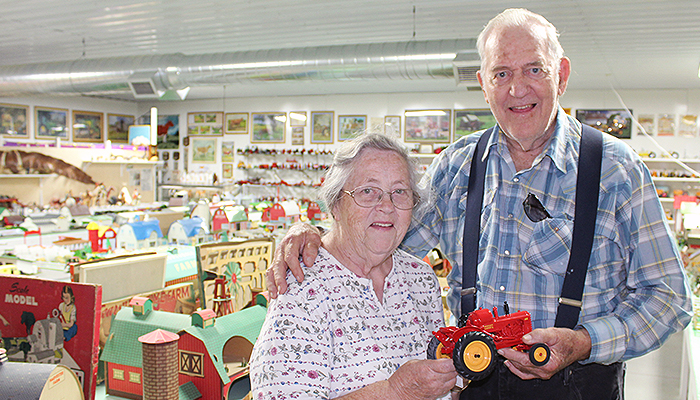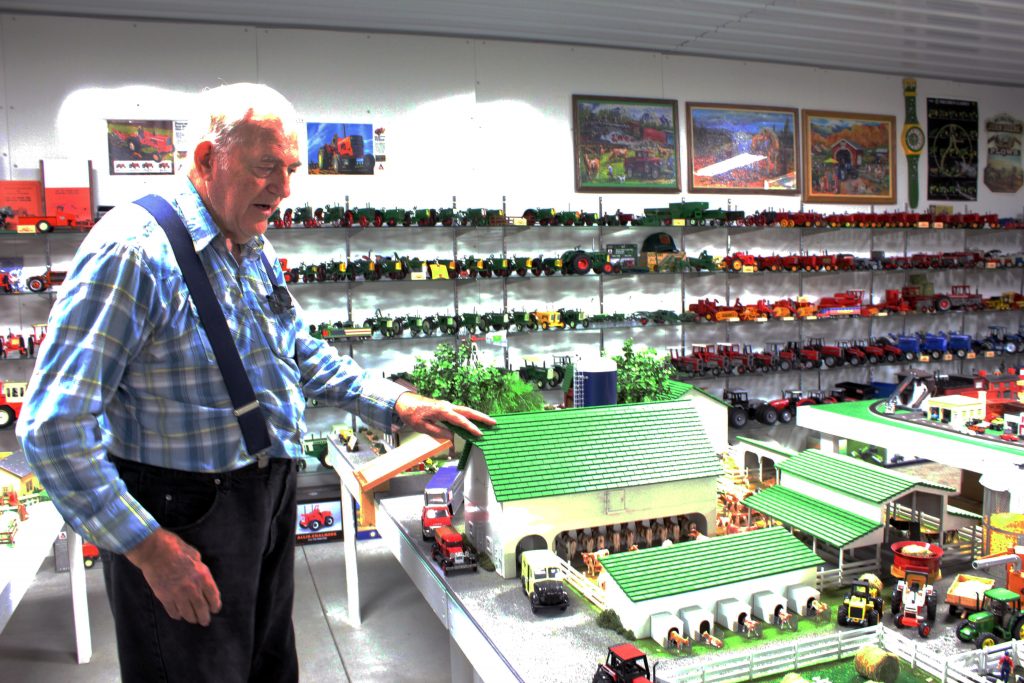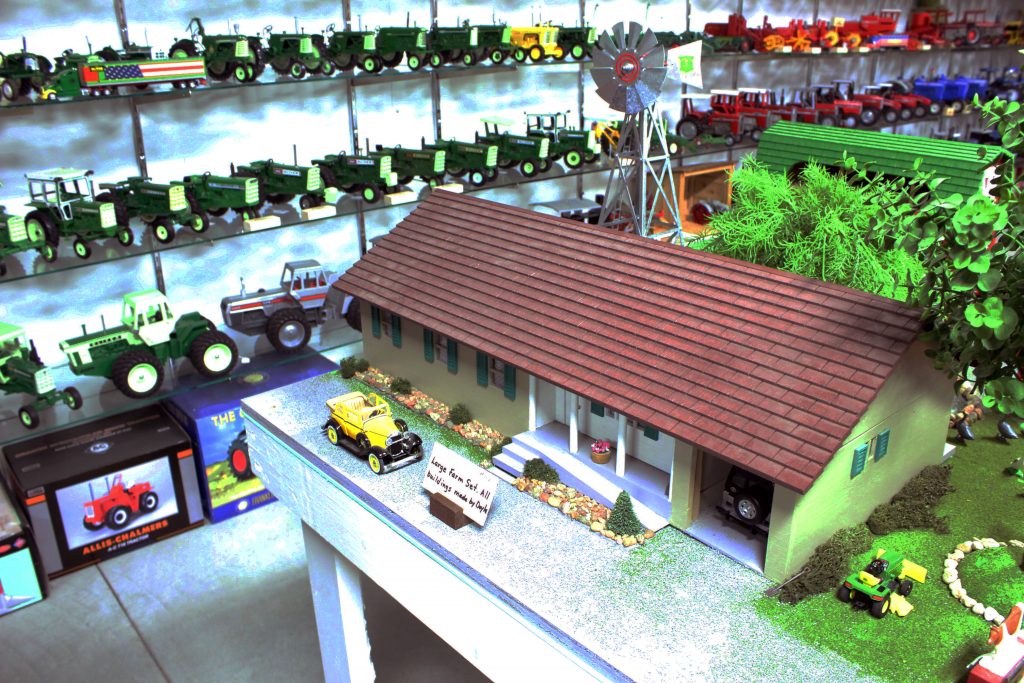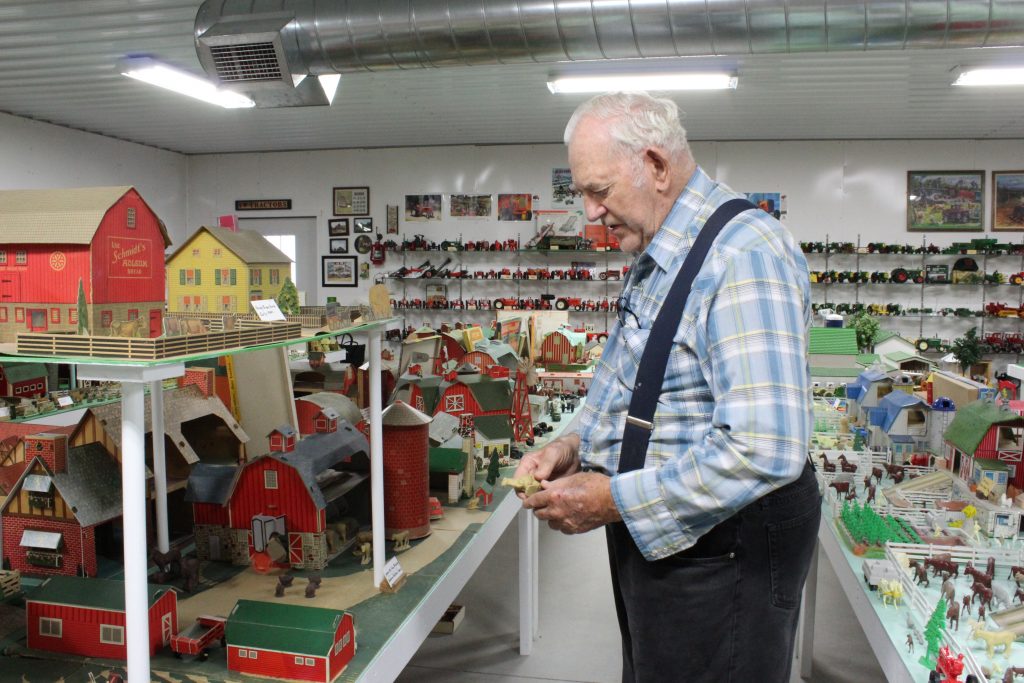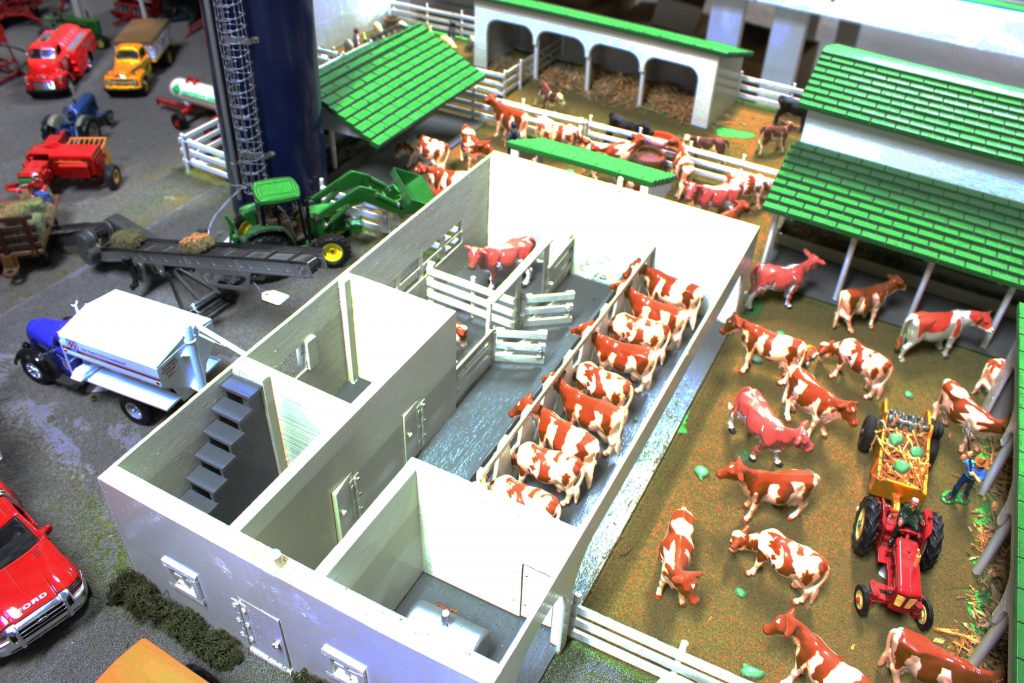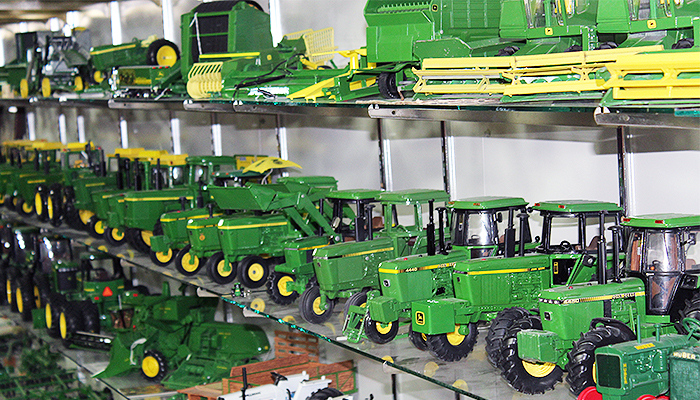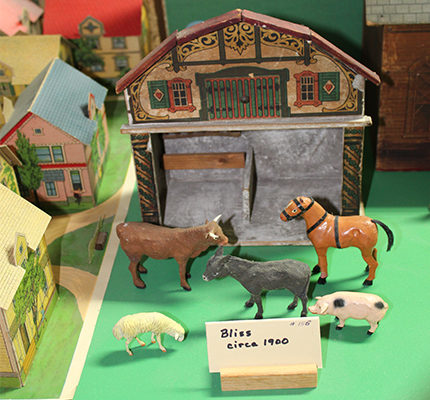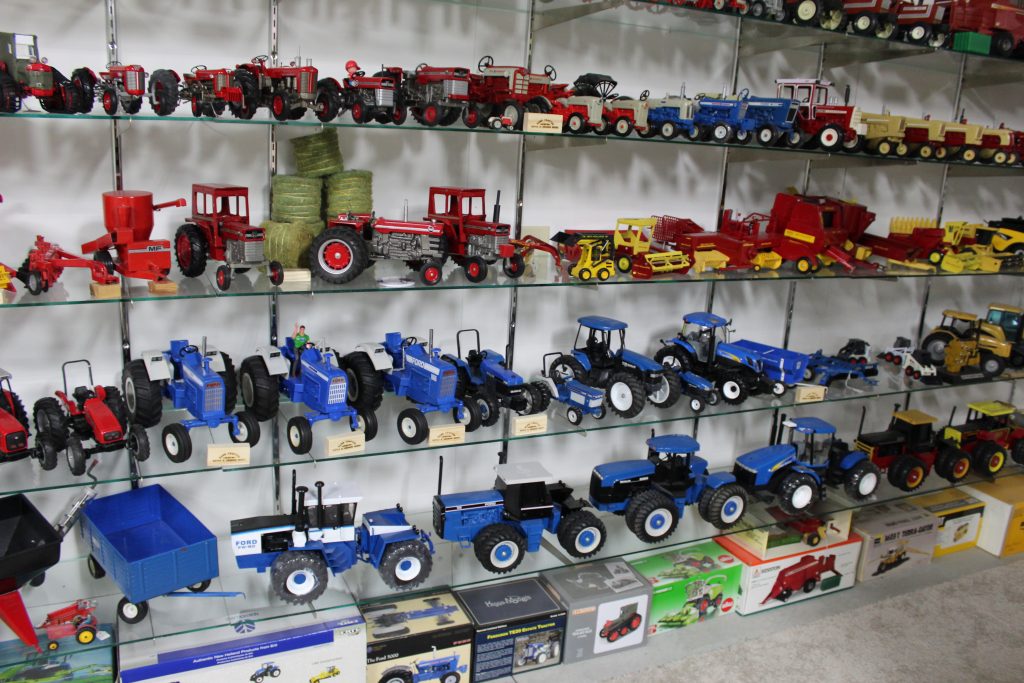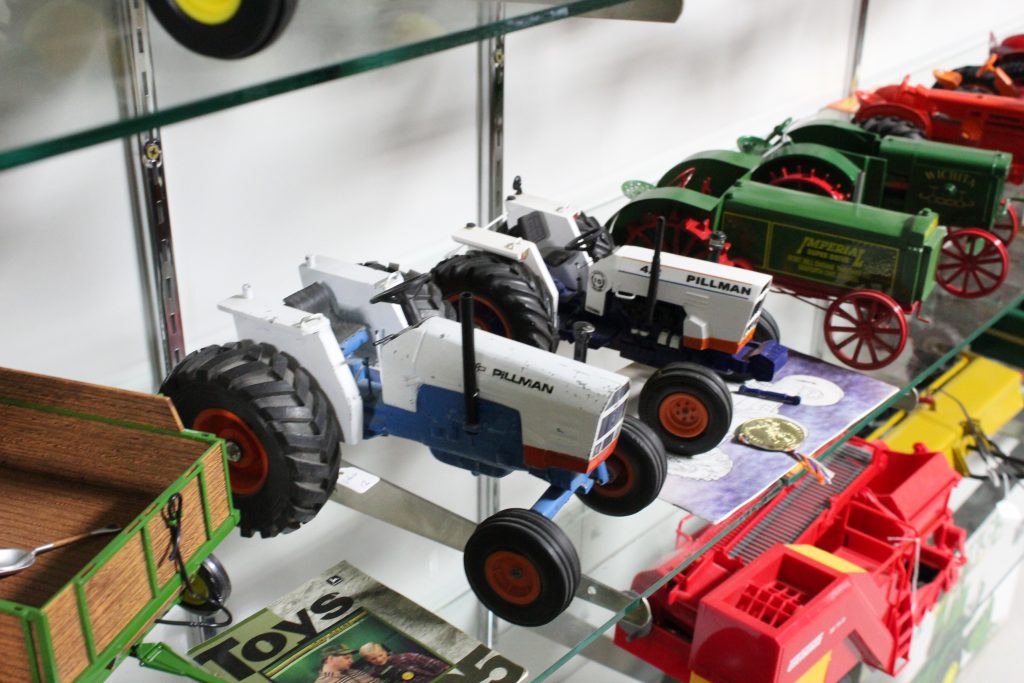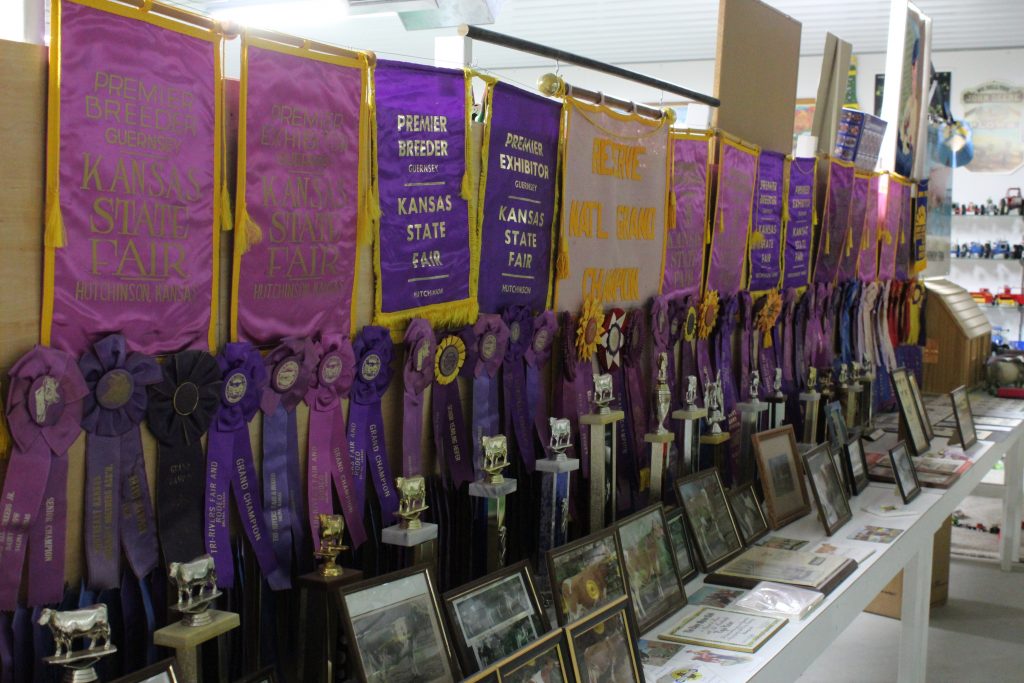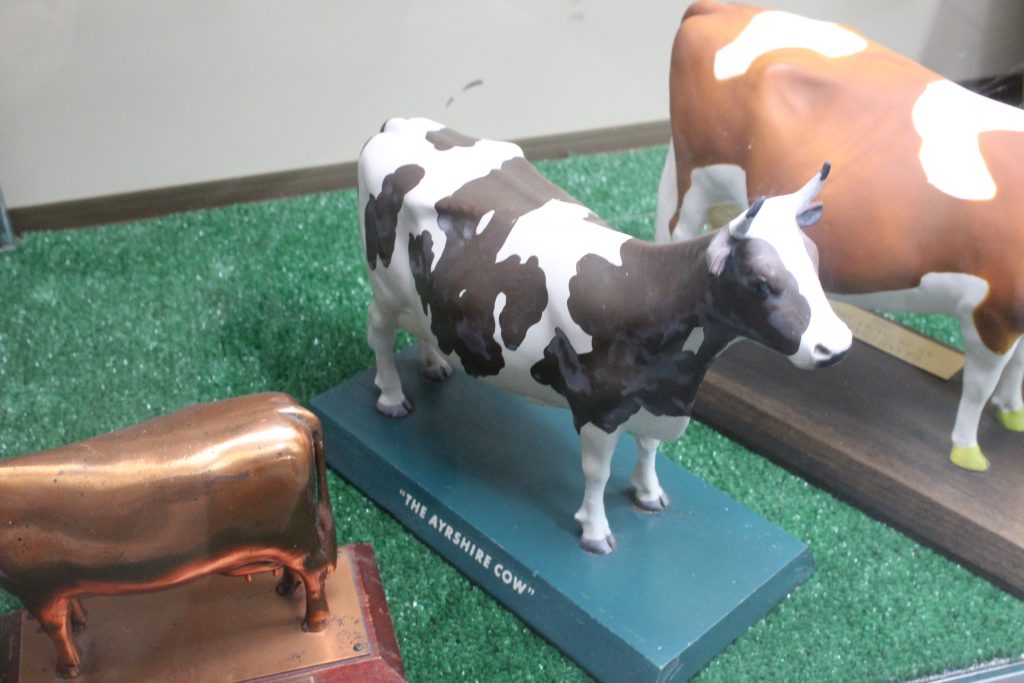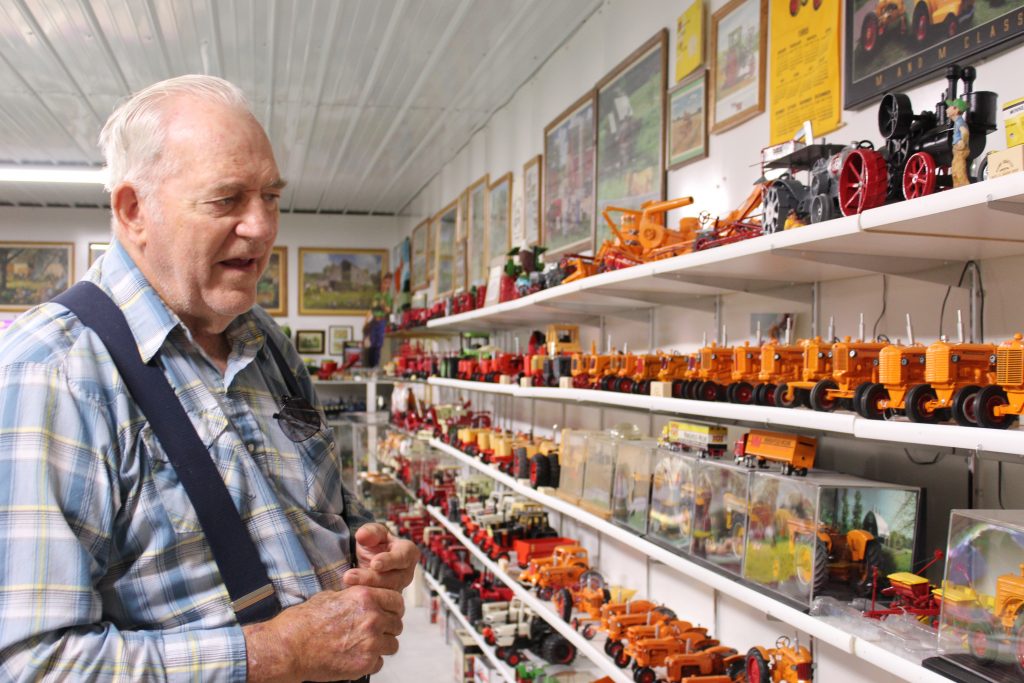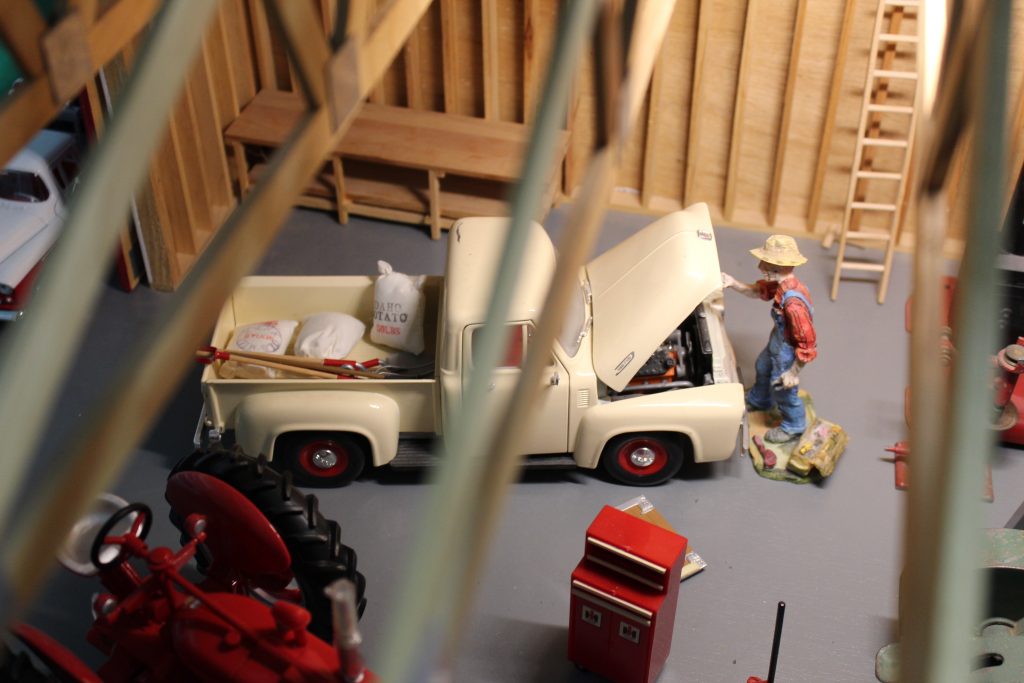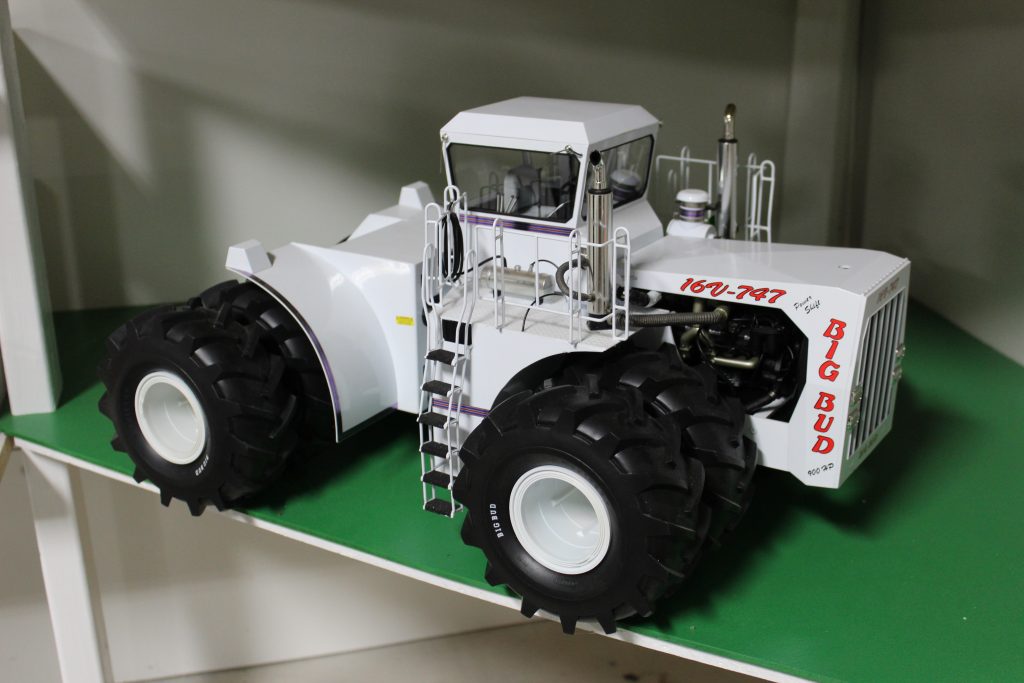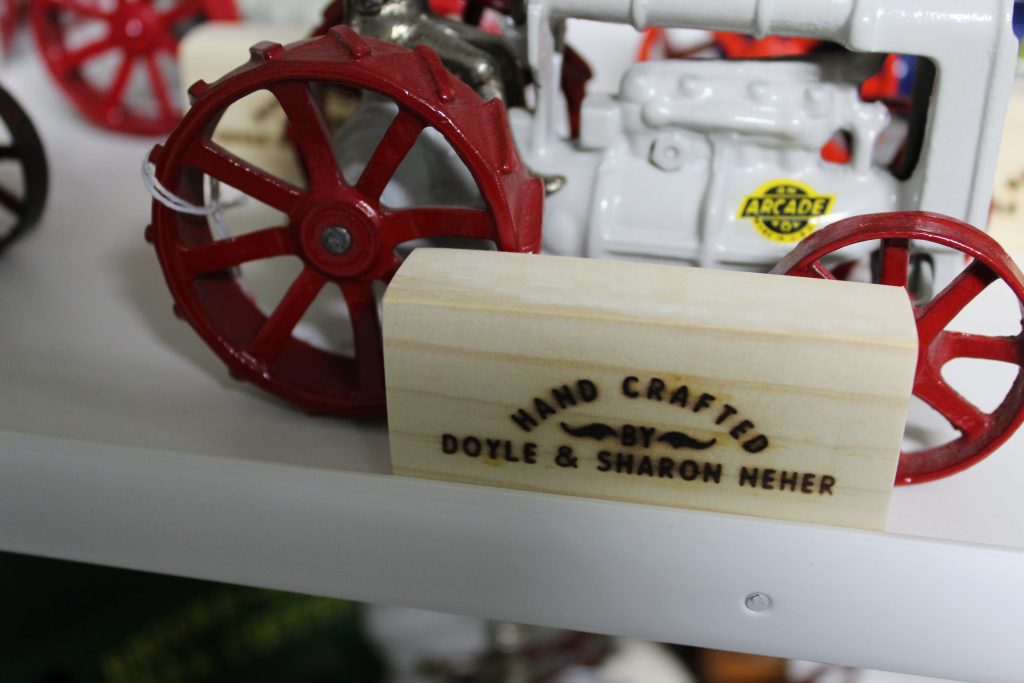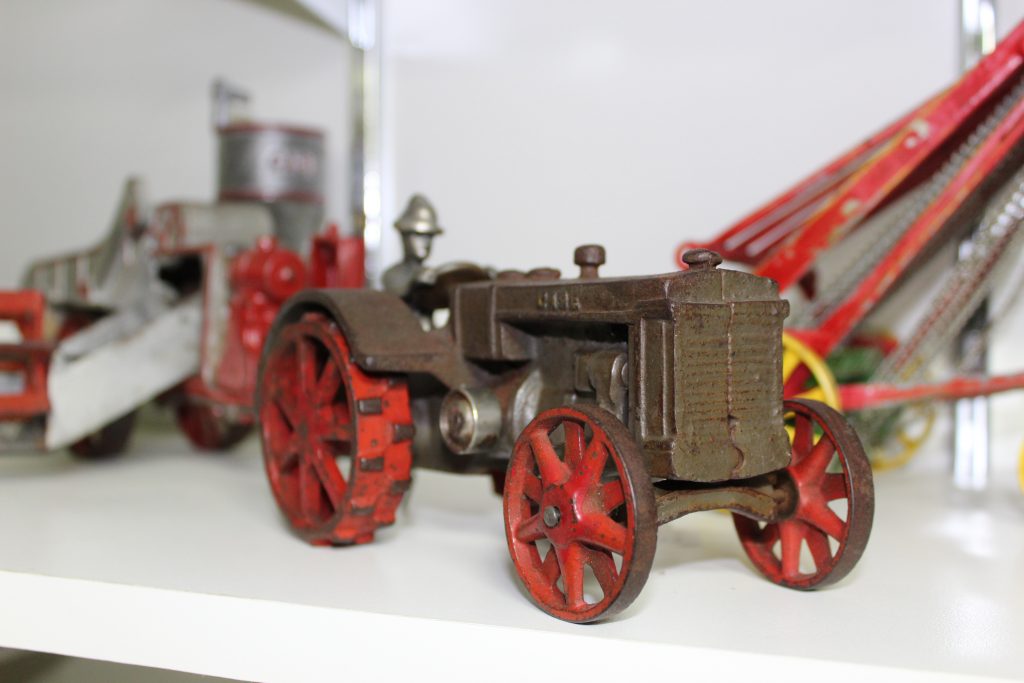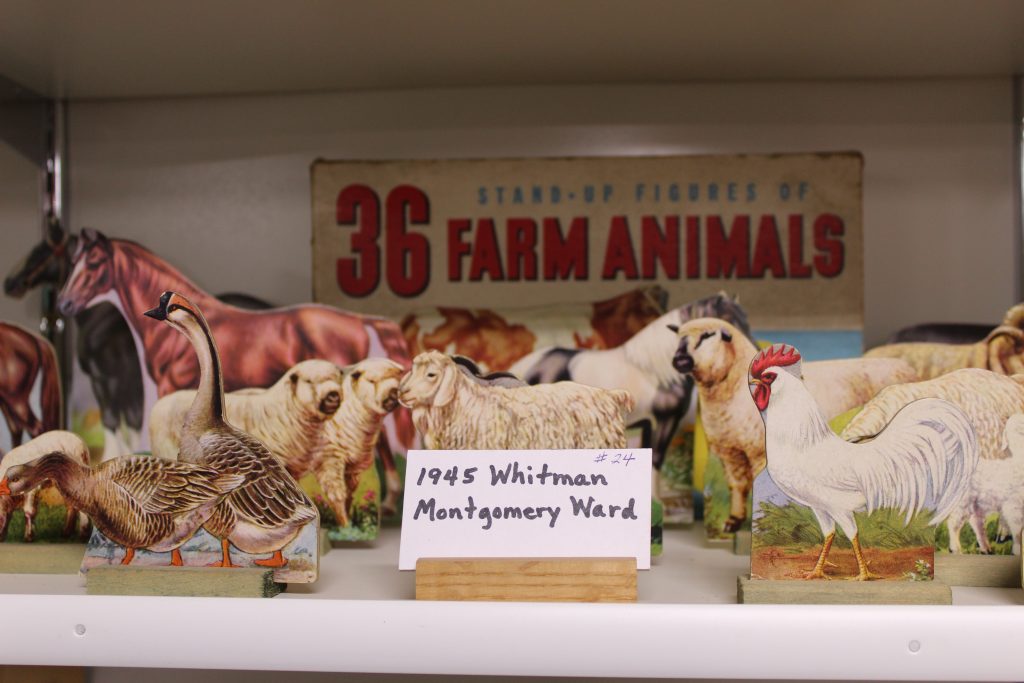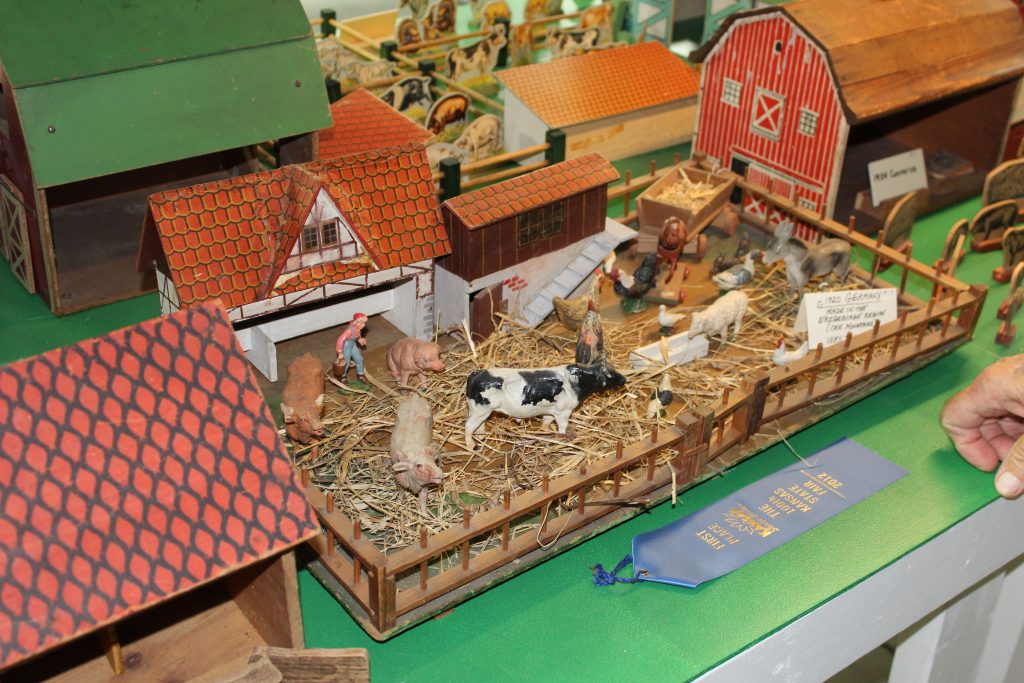By CRISTINA JANNEY
Hays Post
PFEIFER — In a nondescript metal building in rural Pfeifer is a child’s dream.
Doyle Neher’s Harmony Toy Farm Museum has more than 1,000 toys — 900 tractors and more than 100 farm sets. The collection has been accumulated over almost three decades.
Behind every toy in that collection, some hand crafted by Neher, is a story.
Neher, 81, started collecting in 1991 when his oldest grandchild was 3 years old.

“We were discussing what to get them for Christmas, and I thought that every kid needed a toy tractor. We went to Tractor Supply and picked them out a tractor. We went to Tractor Supply, and they had an A-Farmall model in there. That was the first tractor my dad bought, and the tractor that I learned to drive first. I was standing there looking at it, (my wife) says, ‘If you want it, go ahead and buy it.’ I bought a toy tractor in 1991, and this is what has happened since,” Doyle said motioning to the room filled floor to ceiling with shelves lined with toy tractors of all makes and models.
Doyle grew up on a hatchery and dairy near Oswego and then ran a dairy farm near Hutchinson until his retirement in the 1990s. He had toy tractors when he was a kid, but those are all long gone.
In honor of a lifetime of farming, he create a model of his father’s farm and his and his wife’s Sharon’s home in Hutchinson.

Doyle as a farmer was used to working with machinery and working with his hands. If you visit the museum, you will see dozens of toys with small wooden blocks in front of them. All of these toys, mostly tractors, are ones that he made, restored or customized. In many instances, he took toy tractors that were mass manufactured and altered them to look like the life-size equipment that ran in the fields. He made multiple copies of some of these original models and sold to other toy collectors.
“My favorite part is finding old tractors and restoring them and making them look nice,” he said. “I have restored over 100 pieces in here. … The second thing would be meeting the people.”
As Doyle has gotten older, his wife has helped him with some of his work on the toys. She helps place small pins and screws that Doyle doesn’t quite have the dexterity to manage anymore.
Of his collection, Sharon said, “I just tell him to go for it.”
However, Sharon acknowledged she was pleased Doyle had his own building to house the toys and her house is no longer taken over by the collection.
Doyle has a small workshop in the rear of the museum where he still works on the tractors, constantly making new creations.
One of his latest projects is to add a second railroad track to the H-O gauge he has in a farm scene displayed in the middle of the museum.
Neher finds his tractors and farm sets all over. He goes to garage sales, auctions, flea markets, antique stores and toy shows.
His oldest farm set was built in about 1900. He found the set at an antique store in Iowa.

Another set was made in Erzgebirge region of Germany in 1920. Neher had a friend from McPherson who was visiting his daughter in Maryland. The friend saw the farm set in an antique store during the visit and sent a picture to Neher. He called the antique store, made a deal and secured the set for his collection.
He has a paper set that came as a reward in 1948 Quaker Oats puffed rice and puffed wheat cereal. Eight cards were available to collect in the set.
One of his favorite farm sets is a 1945 Whitman set that was sold by Montgomery Ward. The 36 cardboard figures each had the description of the animals printed on the back. He collected many of these sets and sold them at toy shows.

The first farm sets were made out of wood. Animals in the 1930s were made from rubber. When World War II broke out, the animals were made from the same molds but out of clay because rubber was essential to the war effort. After the war was over, they went back to rubber. In the 1950s, the barns started being made out of tin.
The early tractors were made of cast iron. His oldest toy tractor dates back to the 1920s. After searching for years, he drove to Kansas City to buy this rare tractor from a flea market vendor. Neher said he went into a garage in a nice residential area, and it was packed floor to ceiling with boxes. With great anticipation, he made his way through a narrow path to a table in the back of the garage where the toy was sitting. He made the deal and took home the tractor.
Neher also has a scale replica of the largest tractor every made — Big Bud, which was powered by a 16V, 747 engine. During a rebuild, the tractor was increased to 900 horsepower. Only a limited number of the toys were manufactured. The life-size tractor is currently on display at a museum in Clarion, Iowa.

Neher shared a little bit of tractor trivia as he surveyed his collection of Ford tractors. The first mechanical farm equipment was driven by steam. Henry Ford came out with a smaller, less expensive gas-powered F-series tractor to replace the bulky steam-powered implements. The F-series was very popular with farmers, so General Motors bought the Sampson Company and came out with a tractor similar to F-series.
GM couldn’t beat Ford on price. They tried to make the tractors less expensive, but the product was so bad, almost all the tractors that were manufactured ended up back with GM on warranty. Neher has a couple of models of these rare tractors in his collection.
“That was the end of General Motors being in the tractor business,” he said.
Doyle and Sharon have met many friends through Doyle’s toy collecting through toy shows and selling and farm sets and tractors.
Neher voice began to shake and his eyes began to gloss over with tears as he talked about a particular tractor he received from a man he never met.
The man was from Pennsylvania, and he sold him a couple of farm sets through the mail.
“He kept writing back, saying that when he got better he was joining to do such and such and when I got a mate (toy) I’ll send you one,” Neher said. “Well, he never got better. He died. I got that tractor in the mail one day from his wife. She said he wanted you to have that tractor. … That is something really special for someone to give you something — something from someone you never met.”

Another woman from Vermont sent an Ayrshire cow model to Neher. The models are rare. They were awarded at the state fair for grand champion cow. However, the Ayrshire headquarters burned down and it is unknown how many of the models were manufactured before the fire.
Neher searched for 10 years for the model. The woman from Vermont found the prized cow model in a box of things she bought at a garage sale. He restored the cow, which had one ear, both horns and the tail broken off.
Another long table in the museum is hung with dozens of blue and purple ribbons from the livestock the Nehers showed at fairs. The family stood first in the class over 300 times and was premier breeder and exhibitor 20 times at the state fair. They had a reserve national grand champion in 1978. In 1985, they had a best breed cow known exhibitor at the national show in the 2-year-old and 3-year-old category.
Doyle and his son, Jeff, also collected baseball cards at one time. They have sold all of them except one complete set from 1953. This includes Satchel Paige, Willie Mays, Mickey Mantle and Jackie Robinson.
In addition to this set, he also has a card for a pro player who was born in 1922 in Pfeifer — Monty Basgall. He was a second baseman for the Pittsburgh Pirates. Later in his career, he was a coach for the Dodgers under Tommy Lasorda.
Jeff is a pastor and is busy with a large family and a goat farm in Pfeifer. However, Jeff had a role in his dad’s collection. One Christmas break when he was home from college, the farther and son made a farm shed equipped with an old truck and farm tractors. The set even has a tiny jack, air compressor and mechanic’s tool box.
Doyle said his older grandchildren, who are teenagers, are not interested in the toy collection anymore, and Jeff is too busy to be very involved. Doyle and his wife made a little carpeted corner in the museum where the smallest grandchildren, Joshua, 4, and Tucker, almost 2, can play with some of their own less collectible toy tractors.
Doyle said he is not sure what will happen to his collection, but he hopes the youngest grandchildren will eventually take interest in the toys and catch the collecting bug.
“It will be our children’s problem,” Sharon said.
The Harmony Farm Toy Museum is open for tours by appointment. Call 620-662-7592 or email [email protected].
